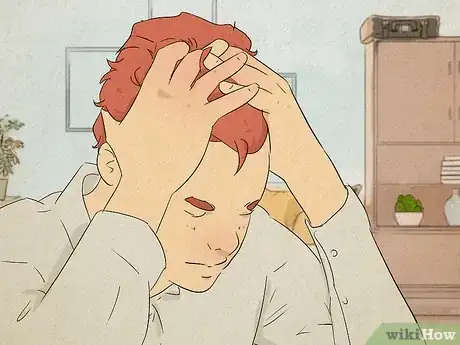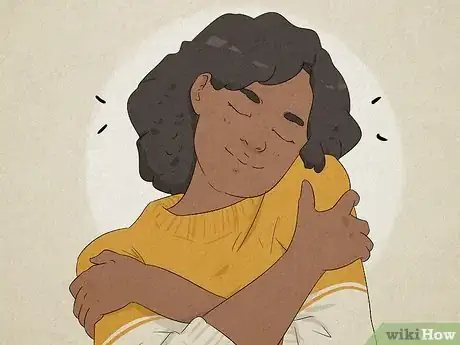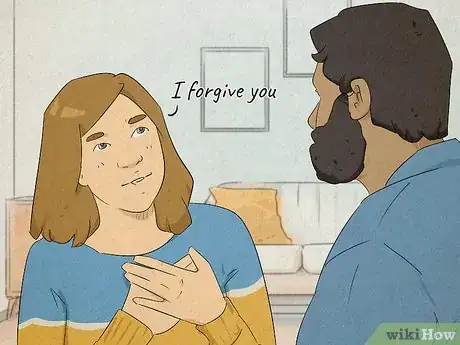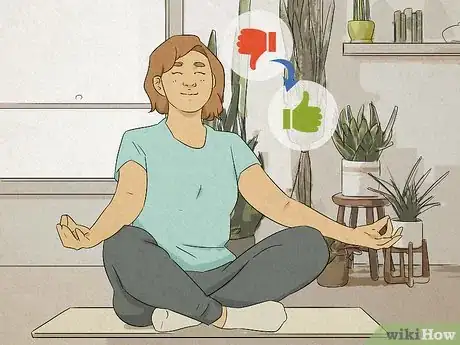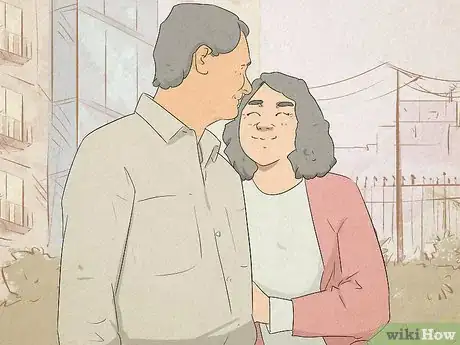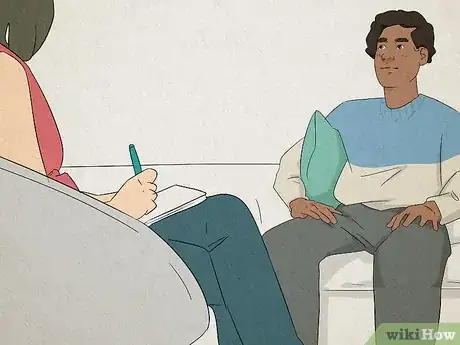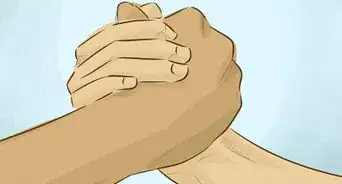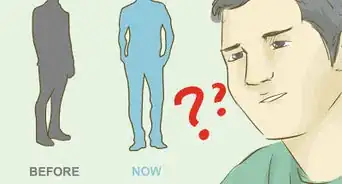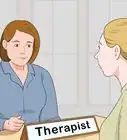This article was co-authored by Ashley Smith, PhD and by wikiHow staff writer, Janice Tieperman. Dr. Ashley Smith is a Licensed Clinical Psychologist and the Co-Founder of Peak Mind: The Center for Psychological Strength. With over a decade of experience, she specializes in treating anxiety and obsessive-compulsive spectrum disorders using Cognitive Behavioral Therapy (CBT). Dr. Smith has been featured in several media publications such as The Washington Post and Thrive Global. She has also been published in multiple peer-reviewed journals, including the Journal of Anxiety Disorders and The Behavior Therapist. Dr. Smith holds a BA in Psychology from The University of Central Arkansas and both an MA and PhD in Clinical Psychology from The University of Nebraska, Lincoln.
There are 9 references cited in this article, which can be found at the bottom of the page.
This article has been viewed 9,452 times.
Trusting and believing in the people around you is really hard, especially if you struggle with trust issues. How do you know if someone truly has your best interests at heart? Don’t worry. While learning to believe in others isn’t easy, it’s definitely not impossible, either. We’ve put together plenty of tips and strategies to help you reflect, heal, and put your best foot forward in your future relationships.
Steps
Expert Q&A
-
QuestionWhat does it mean to believe in someone?
 Ashley Smith, PhDDr. Ashley Smith is a Licensed Clinical Psychologist and the Co-Founder of Peak Mind: The Center for Psychological Strength. With over a decade of experience, she specializes in treating anxiety and obsessive-compulsive spectrum disorders using Cognitive Behavioral Therapy (CBT). Dr. Smith has been featured in several media publications such as The Washington Post and Thrive Global. She has also been published in multiple peer-reviewed journals, including the Journal of Anxiety Disorders and The Behavior Therapist. Dr. Smith holds a BA in Psychology from The University of Central Arkansas and both an MA and PhD in Clinical Psychology from The University of Nebraska, Lincoln.
Ashley Smith, PhDDr. Ashley Smith is a Licensed Clinical Psychologist and the Co-Founder of Peak Mind: The Center for Psychological Strength. With over a decade of experience, she specializes in treating anxiety and obsessive-compulsive spectrum disorders using Cognitive Behavioral Therapy (CBT). Dr. Smith has been featured in several media publications such as The Washington Post and Thrive Global. She has also been published in multiple peer-reviewed journals, including the Journal of Anxiety Disorders and The Behavior Therapist. Dr. Smith holds a BA in Psychology from The University of Central Arkansas and both an MA and PhD in Clinical Psychology from The University of Nebraska, Lincoln.
Licensed Clinical Psychologist Believing and trusting someone is all about putting yourself out there. You're accepting the risk of getting hurt for the opportunity to be closer with someone.
Believing and trusting someone is all about putting yourself out there. You're accepting the risk of getting hurt for the opportunity to be closer with someone. -
QuestionWhat do I do if I can't trust anyone?
 Ashley Smith, PhDDr. Ashley Smith is a Licensed Clinical Psychologist and the Co-Founder of Peak Mind: The Center for Psychological Strength. With over a decade of experience, she specializes in treating anxiety and obsessive-compulsive spectrum disorders using Cognitive Behavioral Therapy (CBT). Dr. Smith has been featured in several media publications such as The Washington Post and Thrive Global. She has also been published in multiple peer-reviewed journals, including the Journal of Anxiety Disorders and The Behavior Therapist. Dr. Smith holds a BA in Psychology from The University of Central Arkansas and both an MA and PhD in Clinical Psychology from The University of Nebraska, Lincoln.
Ashley Smith, PhDDr. Ashley Smith is a Licensed Clinical Psychologist and the Co-Founder of Peak Mind: The Center for Psychological Strength. With over a decade of experience, she specializes in treating anxiety and obsessive-compulsive spectrum disorders using Cognitive Behavioral Therapy (CBT). Dr. Smith has been featured in several media publications such as The Washington Post and Thrive Global. She has also been published in multiple peer-reviewed journals, including the Journal of Anxiety Disorders and The Behavior Therapist. Dr. Smith holds a BA in Psychology from The University of Central Arkansas and both an MA and PhD in Clinical Psychology from The University of Nebraska, Lincoln.
Licensed Clinical Psychologist Take small steps in your friendships and relationships. You don't have to 100% trust someone at once—instead, give them small opportunities to gradually show that they're trustworthy. Over time, you might feel more comfortable confiding in someone who consistently doesn't let you down.
Take small steps in your friendships and relationships. You don't have to 100% trust someone at once—instead, give them small opportunities to gradually show that they're trustworthy. Over time, you might feel more comfortable confiding in someone who consistently doesn't let you down. -
QuestionWhat does it mean when you can't trust someone?
 Ashley Smith, PhDDr. Ashley Smith is a Licensed Clinical Psychologist and the Co-Founder of Peak Mind: The Center for Psychological Strength. With over a decade of experience, she specializes in treating anxiety and obsessive-compulsive spectrum disorders using Cognitive Behavioral Therapy (CBT). Dr. Smith has been featured in several media publications such as The Washington Post and Thrive Global. She has also been published in multiple peer-reviewed journals, including the Journal of Anxiety Disorders and The Behavior Therapist. Dr. Smith holds a BA in Psychology from The University of Central Arkansas and both an MA and PhD in Clinical Psychology from The University of Nebraska, Lincoln.
Ashley Smith, PhDDr. Ashley Smith is a Licensed Clinical Psychologist and the Co-Founder of Peak Mind: The Center for Psychological Strength. With over a decade of experience, she specializes in treating anxiety and obsessive-compulsive spectrum disorders using Cognitive Behavioral Therapy (CBT). Dr. Smith has been featured in several media publications such as The Washington Post and Thrive Global. She has also been published in multiple peer-reviewed journals, including the Journal of Anxiety Disorders and The Behavior Therapist. Dr. Smith holds a BA in Psychology from The University of Central Arkansas and both an MA and PhD in Clinical Psychology from The University of Nebraska, Lincoln.
Licensed Clinical Psychologist Being unable to trust someone means you're afraid of being taken advantage of. Saying "I don't trust someone" is the same as saying "I'm afraid of getting hurt in some way. I don't want to open up and be vulnerable to this person because I either am worried about how they're going to react."
Being unable to trust someone means you're afraid of being taken advantage of. Saying "I don't trust someone" is the same as saying "I'm afraid of getting hurt in some way. I don't want to open up and be vulnerable to this person because I either am worried about how they're going to react."
References
- ↑ https://www.psychologytoday.com/us/basics/trust#the-roots-of-distrust
- ↑ Ashley Smith, PhD. Licensed Clinical Psychologist. Expert Interview. 22 October 2021.
- ↑ https://psychcentral.com/blog/healing-the-wounds-of-betrayal#4
- ↑ https://www.psychologytoday.com/us/blog/living-forward/201609/how-rebuild-trust-someone-who-hurt-you
- ↑ https://www.psychologytoday.com/us/blog/living-forward/201609/how-rebuild-trust-someone-who-hurt-you
- ↑ https://www.psychologytoday.com/us/blog/mindful-anger/201409/how-do-you-forgive-even-when-it-feels-impossible-part-1
- ↑ https://psychcentral.com/blog/3-ways-to-develop-self-trust#4
- ↑ https://psychcentral.com/blog/3-ways-to-develop-self-trust#5
- ↑ Ashley Smith, PhD. Licensed Clinical Psychologist. Expert Interview. 22 October 2021.
- ↑ https://www.psychologytoday.com/us/blog/healing-sexual-trauma/202010/can-you-trust-again-after-being-betrayed
- ↑ Ashley Smith, PhD. Licensed Clinical Psychologist. Expert Interview. 22 October 2021.
- ↑ https://psychcentral.com/blog/healing-the-wounds-of-betrayal#4
- ↑ https://www.psychologytoday.com/us/blog/healing-sexual-trauma/202010/can-you-trust-again-after-being-betrayed
- ↑ https://www.goodtherapy.org/blog/the-psychology-of-trust-issues-and-ways-to-overcome-them


